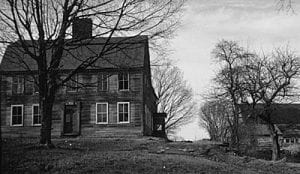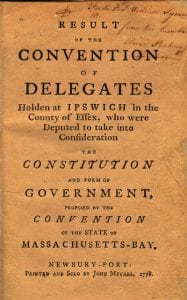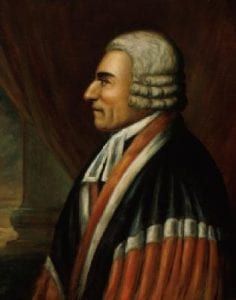The Quock Walker Case
By: Jack Hisle
The follow article will cover the effects of slavery in the Northern and Southern Colonies and how it made Massachusetts the first state to abolish slavery.
For my research I used the Massachusetts Historical Society website and various biographical web pages that documented certain slaves lives. I also used various bills of sale pertaining to the buying and selling of slaves, and an assortment of court documents from the 17th century. I also included information I learned from reading the book, The Great Awakening by Thomas Kidd.
Among the greater accomplishments the United States experienced, as a young nation there was one key misstep: slavery. Although previously embracing slavery ,the state of Massachusetts was indeed the first state to abolish the practice, thus developing the trend of eradicating slavery from all northern states.
There are several reasons why slavery swiftly ended in the northern colonies compared to the southern colonies. For example, slavery in the north centered more on individuals’ skills, specifically slaves in the northern colonies were generally used as house servants, laborers, and craftsmen, thus allowing for more interactions between the slave and the slave owner, as these slaves had invaluable skills. Contrarily, slavery in the southern colonies consisted of slaves being used on a mass level, as slaves were typically used mostly for agriculture to harvest commodity crops like tobacco and cotton. The reliance on agriculture distanced the southern slave owners from their slaves as they began to treat them like cattle instead of having a personal bond with them, and as result, slavery in the south remained acceptable, while slavery in the north became increasingly unacceptable due to masters more personal interaction with their slaves. By 1804, the entire region of New England had abolished slavery entirely.

The home where Walker hid after he ran away.
In 1753 Quock Walker, one of the most influential African American slaves of the 18th century, was born. Quock or Kwaku in Akan, means “boy born on Wednesday,” in Akan. Akan is a language of Ghanaian origin, which is where Quock Walker’s parents are believed to be from. Quock was born in Massachusetts and lived with the respected Caldwell Family from Worcester. James Caldwell, the man of the household, promised Quock his freedom at age 25. This was not uncommon in the north, as many owners would use slavery as a type of indentured servitude. James passed away when Quock was just ten years old, but it did not stop his widow from renewing the promise of his freedom. Mrs. Caldwell quickly remarried a man named Nathaniel Jennison in 1763, but then Mrs. Caldwell died in 1772. By this time, Quock was 19 and technically only had 6 more years of being a slave. When Quock turned 25, Jennison refused free him. Quock ran away three years later to a nearby farm that was owned by Seth and John Caldwell, James’s brothers. Jennison found Quock shortly after he ran away and beat Walker severely. Quock Walker quickly hired a lawyer and filed to sue Jennison for assault and battery.
 Likewise, Jennison also hired a lawyer for “deprivation of the benefit of his servant, Walker.”(MassHist.org) The Worcester County Court of Common Pleas awarded Jennison 25 pounds as they believed that John and Seth Caldwell enticed Quock to run away. More importantly Quock Walker’s lawyers used the newly established Massachusetts Constitution, established in 1780, to argue that slavery contradicted the Constitution and Walker should be a free man. The part of the Massachusetts Constitution that Walker’s lawyers believed contradicted slavery was stated in Article I of the Constitution,
Likewise, Jennison also hired a lawyer for “deprivation of the benefit of his servant, Walker.”(MassHist.org) The Worcester County Court of Common Pleas awarded Jennison 25 pounds as they believed that John and Seth Caldwell enticed Quock to run away. More importantly Quock Walker’s lawyers used the newly established Massachusetts Constitution, established in 1780, to argue that slavery contradicted the Constitution and Walker should be a free man. The part of the Massachusetts Constitution that Walker’s lawyers believed contradicted slavery was stated in Article I of the Constitution,
All men are born free and equal, and have certain natural, essential, and unalienable rights; among which may be reckoned the right of enjoying and defending their lives and liberties; that of acquiring, possessing, and protecting property; in fine, that of seeking and obtaining their safety and happiness. (Masshist.org)
The jury ultimately agreed and awarded him 50 pounds for damages and granted his freedom.

William Cushing (1732-1810)
However, the story was not over as the attorney general, Chief Justice William Cushing, filed a criminal assault and battery charge against Jennison three months later. Cushing stated, “I think the idea of slavery is inconsistent with our own conduct and Constitution; and there can be no such thing as perpetual servitude of a rational creature, unless his liberty is forfeited by some criminal conduct or given up by personal consent or contract.”
This statement constitutionally ended slavery in Massachusetts as it went against the fundamental state of “all men are created equal.” Nevertheless a formal law nor an amendment was never officially put in place. By 1790 the U.S. census concurred that there were no slaves in the state of Massachusetts.
Works Cited:
Kidd, T. (2007). The Great Awakening. New Haven: Yale University Press.
Masshist.org. (2017). African Americans and the End of Slavery in Massachusetts. [online] Available at: http://www.masshist.org/endofslavery/index.php?id=60 [Accessed 17 Oct. 2017].
John Adams & the Massachusetts Constitution, Massachusetts Court System: http://www.mass.gov/courts/court-info/sjc/edu-res-center/jn-adams/mass-constitution-1-gen.html
Further Reading:
The Massachusetts Constitution
The Case of Elizabeth Freeman: Another Slave Emancipation
The Significance of Elizabeth Freeman by Margaret Washington
The New England Historical Society
One of Boston’s most important African American figures, Prince Hall
